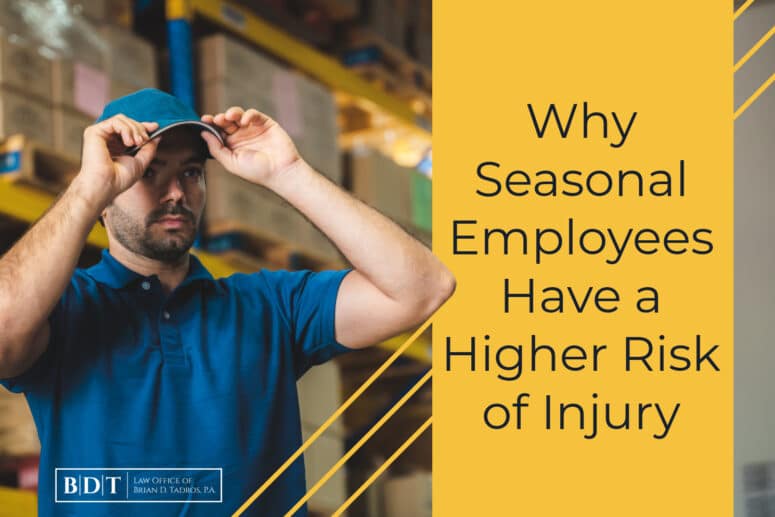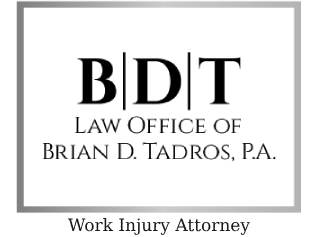
The holidays are quickly approaching, which means an increase in seasonal employment as some people take on new jobs to help pay their bills. The fall and winter months are some of the busiest times of the year for businesses, leading many to hire seasonal employees.
Seasonal employee work can be a great way to pay for holiday gifts or travel expenses, but there is some risk involved. Studies have shown that new hires are three times more likely than veteran employees to sustain a workplace injury—especially within the first month of the job.
Seasonal workers are usually less experienced and may not have received proper safety training from their employer. As a result, there are more workplace injuries. Some jobs, such as those in retail and agriculture, have a higher risk of injury due to the physical and emotional demands that seasonal workers are unaccustomed to.
Why Seasonal Employment Jobs Have a Higher Risk of Injury
From inconsistent hours of work to unfamiliar tasks, there are many ways that a seasonal job can affect your health and well-being more than a regular one.

Job is Inherently More Dangerous
High-risk jobs, such as warehouse and factory work, are more likely to hire seasonal workers. These jobs often require workers to be in close quarters and be on their feet for long periods of time, increasing the risk of injury. Busy retail stores and restaurants carry a similar risk of injuries due to spills, lack of training, and the high volume of customers.
Lack of Training & Experience
Seasonal employment jobs often involve using new and unfamiliar equipment. It’s common for seasonal workers to be untrained in the safety measures and proper use of equipment and machinery.
Not Used to Physical Demands
Seasonal workers are more susceptible to injury because they are not used to the physical demands of the job. A seasonal worker, for example, who is used to working at a desk all day might not be accustomed to the physical demands of lifting heavy boxes. This can result in sprains and perhaps other injuries.

Busier Environment
If an employer needs to hire seasonal workers, it’s likely due to an increase in demand. Employees may be pressured to work quickly, handle more customers than usual, and even navigate clutter around the workplace. Additionally, less experienced seasonal workers may feel they need to rush to keep up with full-time employees.
Less Likely to Speak Up
Since these are often part-time positions, seasonal workers can be reluctant to speak up about safety concerns as they haven’t been employed for a long time and will only be staying for several months.

Injured at Work In Florida?
Injury Prevention Tips
If you’re taking on seasonal work this holiday season, here are some workplace injury prevention tips for staying safe and injury-free.
- Abide by all safety rules and regulations.
- Familiarize yourself with all safety equipment.
- Dress for comfort and performance. (In addition to following dress codes.)
- Look for jobs where your experience and skill set makes you a good fit.
- A busy holiday season is not the time to try a new career.
- Listen to your body. Don’t push yourself past your limits.
- Speak out against unsafe practices.
Seasonal Workers Are Entitled to Workers’ Compensation
Under Florida law, employers are required to carry worker’s compensation if they have a certain number of full- or part-time workers. Seasonal and temporary hires have the same level of protection as full-time employees, including workers’ compensation.
The Bureau of Labor Statistics defines a seasonal job as a job that is typically filled for a limited amount of time, such as during the holiday season. Whether you are a seasonal employee or someone that works year-round, you are still an employee.
Not sure if you’re a seasonal worker? Here’s what qualifies a job as seasonal work:
- Work is in retail, tourism, or agriculture.
- Position starts around the same time every year.
- The position usually requires six months of work or less.
Seasonal employment is a great way to supplement your income during the busy season, but it’s not worth getting injured. As the saying goes, “all the money in the world can’t buy good health.” Do your best to stay safe and avoid workplace accidents by following the tips outlined in this article and remaining vigilant while on the job.
Some accidents, however, are unavoidable. If you are the victim of a workplace accident, you must seek the advice of a workers’ compensation attorney as soon as possible. Workers in Florida only have 30 days to file a workers’ compensation claim, so you must get started as quickly as possible to determine whether you have a case.
Because we specialize in handling Florida workers’ compensation cases, the Law Office of Brian D. Tadros can assist you in understanding your rights as an employee. Set up an appointment today for a free consultation to discuss your situation.

